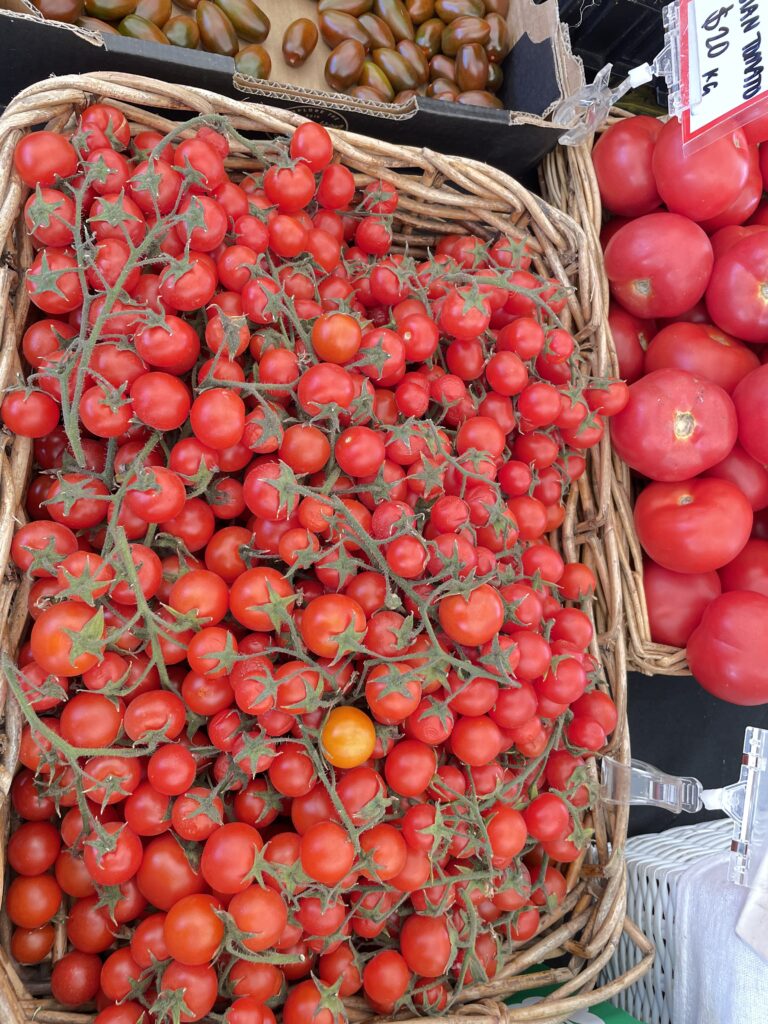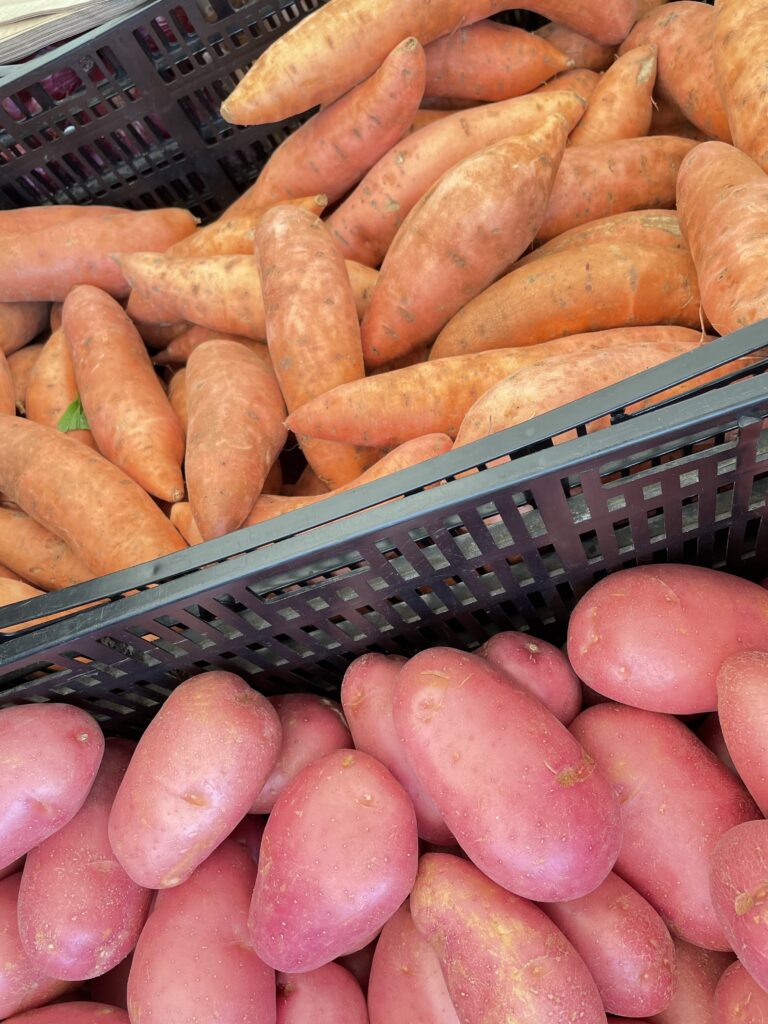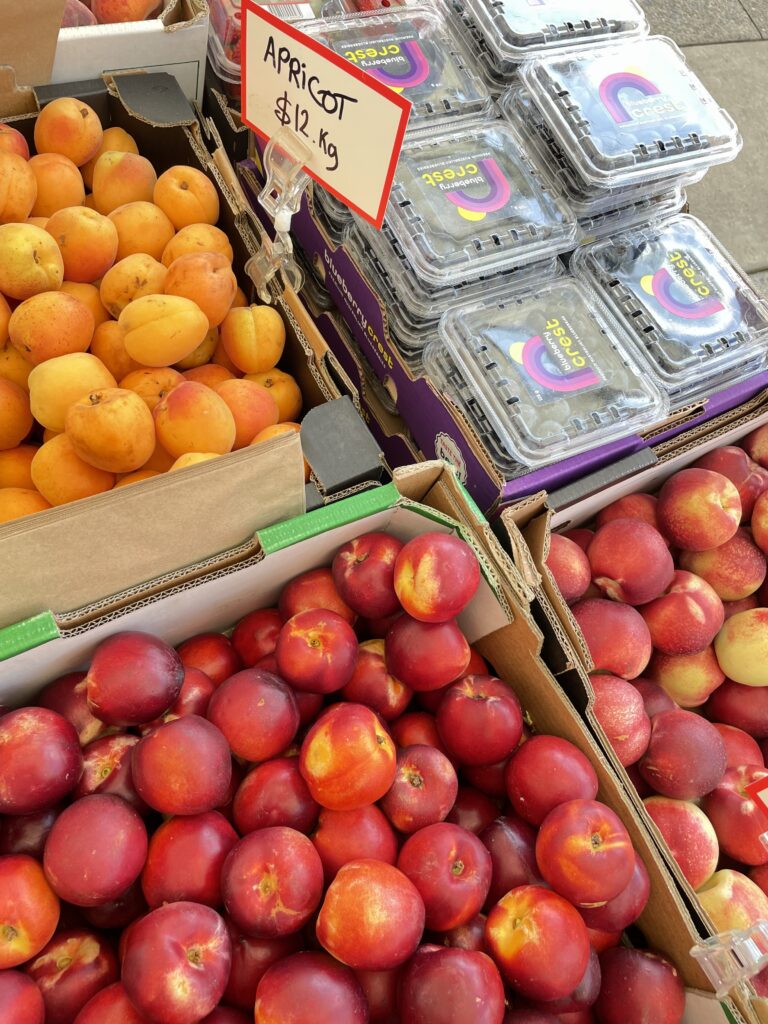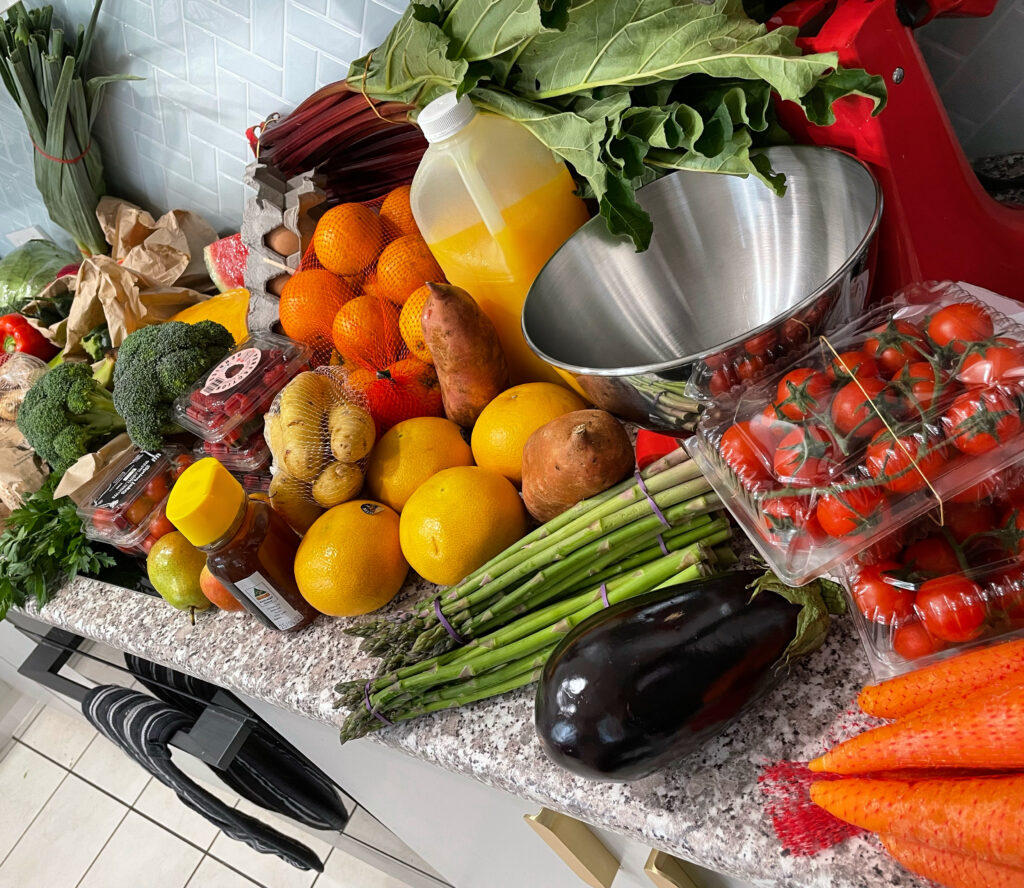Farmers markets – total hype or love of my life
Visiting the farmers markets is one of my favourite events of the week. Being outdoors, seeing all the beautiful colours in the freshest, most beautiful produce always brings a smile to my face.
Ever since I was little I have been visiting the farmers markets. First with my parents of course, then later on my own. Now that I have a family of my own, we try to visit the markets together. At least every once in a while. The kids get so excited to pick their own produce and usually eat far more if they pick it themselves.

Since we don’t live in the city but the outskirts, the nearest markets are a good half hour drive. To make the absolute most of it, there are a few tips I live by and encourage you to follow.
Tips for you
When to go
- Get up early and go. Our markets open at 7am. While I have never managed to get there for open, I usually arrive between 8 and 8.30am. Arriving this early, there is still plenty to choose from. Leaving early also means I am back by 10.30am the latest. At this point we still have most of the day ahead of us.
- Do a big shop every fortnight. What I found was that weekly trips make me feel like I’m eating into my weekends. It becomes more of a chore than a pleasure. Additionally, I tend to just buy anything that looks good. Needless to say this is often too much to go through in just a week. The choice is to either take the same drive for only a few essentials, or skip a week and buy a few bits at the supermarket. Neither option made a lot of sense to me, which is how I came up with my fortnightly visits.
What to buy
- Buy what’s in season, even if you don’t know how to cook it (yet). If you are anything like me it is so easy to fall into the “same meal” trap. Even more so, if you have fussy eaters at home. Buying a selection of seasonal fruit and veg and learning how to cook them expands your culinary horizon. More importantly, it offers you and your family much more variety for weeknight dinners.
- If you buy bread, buy enough for the next two weeks. Our friendly bakery lady gave me the tip to simply slice and freeze her loaves. So clever! Now I often buy a variety of loaves and store them for the weeks to come. This even works for fruit and nut breads. Not only does it make the bread last, it also limits waste and provides a great variety of flavours throughout the week.

- Buy plenty of potatoes. Potatoes are one of my favourite vegetables. They’re so versatile and filling and an amazing staple to have almost daily. I try to get a variety of potatoes (red for roasting, white for mash, sweet for baked potatoes etc.) to easily come up with meal ideas when looking at them.
My Hot Tip
- If you take your kids, invest in a collapsible outdoor cart. The first few times we took our kids to the markets we ended up carrying one child and three heavy grocery bags each. It was exhausting and honestly ruined the experience. On one of those trips we saw another family who got our attention. They had their kids and all their groceries sitting in a huge foldable cart. Everyone looked so happy, their life seemed so easy. The moment we arrived back home we ordered one for ourselves. I have to say, it was one of the best purchases we ever made! No more tears, no more aching backs, and so much more room for heavy produce.

Farmers markets vs grocery store
Farmers markets offer a direct connection to local growers. They provide us with an opportunity to interact with the people growing our food and foster a sense of community. Speaking to growers also provides us with a better understanding of seasonal growing cycles and sustainable farming practices. Produce sold is fresh, seasonal and harvested on or around market day, making it also incredibly delicious. Grocery stores on the other hand focus more on efficiency and year-round availability. This often means that produce is sourced through single wholesale growers and transported long distances to ensure availability. This negatively impacts both flavour and carbon footprint.
Farmers markets and sustainability
Visiting farmers markets builds a connection to local growers and the community. Supporting local growers ensures open spaces are preserved and sustainable farming practices can be maintained. Eliminating long transportation distances also reduces the carbon footprint. With its emphasis on fresh and seasonal produce, we learn to understand the natural growing cycles of our regions. This ultimately allows us to build a more sustainable future.
Where are farmers markets located
Most councils offer regular farmers markets. These are usually held in big communal spaces with ease of access – think town squares, church or race grounds. Most local councils have a separate “markets” or “Event” section listed on their website. You will find information about locations and trading hours there. If you already know of a farm nearby, why not contact them directly? Ask if they are attending a market and where, growers love to share this information.
Are farmers markets cheaper
In my experience, yes. BUT, there’s a bit more to this answer. The thing is, you can probably score a bargain at your local supermarket once in a while. Let’s say strawberries are in season, you can probably buy those for $2 a punnet at the store. At the farmers markets a punnet might be $3.50 around the same time. While this makes the market strawberries more expensive, I find the savings lie in the bigger picture.
An example
Let’s start with taste. Supermarket produce is often picked before its prime so it can survive days of shipping and handling before reaching the shelves. Sadly this means that the flavour is not as rich as its market counterparts. This is where supermarkets often offer “premium” produce, which is usually more flavoursome. The premium strawberries at my local supermarket usually sell for $4.50 a punnet in peak season. Suddenly my market produce is the cheaper option.
Supermarket produce still needs to go through a lot of transit to reach the selves. I don’t know about you, but I often find it bruising in the process. There is rarely a full punnet of perfect strawberries and a good handful need to be thrown away immediately. This intensifies the longer I keep my produce in the fridge. After 3 days I usually need to throw the whole punnet away. This now means that I need to go back and buy yet another $4.50 punnet. My total is now at $9 at the supermarket, compared to the $3.50 market punnet.

Pesticides
Pesticides are also a huge deal for me. Believe it or not, but since arriving in Australia my health has deteriorated quite a bit. I am no scientist and have no actual proof that this has anything to do with pesticides used in produce here. Nevertheless it is a well-known fact that produce here is grown using far more pesticides than permitted in Europe. Now, my diet hasn’t changed much. I am even still cooking the same meals my mum used to serve me growing up. I have a funny feeling that the treatment of foods down here have at least something to do with it.
While smaller farmers might not be able to afford the “organic” certification process, many vendors use little to no pesticides to grow their produce. If in doubt, speak to the farmers and simply ask them how they treat their produce. You can then make an educated decision on what you would like to buy and what to stay away from.
Are farmers markets organic
Not all produce sold at farmers markets is organic, no. But also not ever farmer has the means to go through the organic certification process. What you will likely find is that most small farmers use little to no pesticides when growing their produce. Some stalls may already display messages along the lines of “no pesticides” or similar. If in doubt, simply ask the vendors how they grow their produce. Most people I speak to love to share their story and give you great insight into their business.
How farmers markets work
Farmers markets are often run by local councils. For a small fee, vendors can sell their produce or products to the public. Most markets have a set of criteria vendors need to meet in order to sell. For example, vendors must sell their own produce, must reside in the relevant council and must not mass-produce what they sell. The council’s or market’s website usually lists specific market criteria.

When are farmers markets
Most farmers markets are held on weekends, with some councils offering an additional mid-week market also. In my area these are commonly held on Wednesdays or Thursdays, but this may vary where you are. Council websites generally list market information, including locations and times held.
Why farmers markets are important
Farmers markets are important as they allow growers to sell their produce directly to the consumer. This contributes to the preservation of small agricultural businesses, while promoting a deeper connection between the grower and the consumer. Smaller farms can offer produce fresh and at its peak, meaning we buy food full of nutrients and bursting with flavour. Selling directly to consumers additionally reduces the carbon footprint, as wholesale businesses often transport produce long distances before they reach our supermarket shelves.
